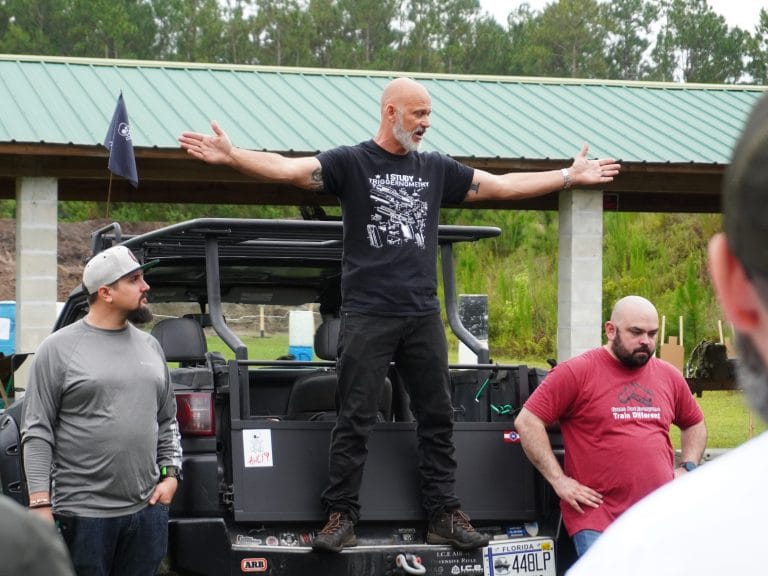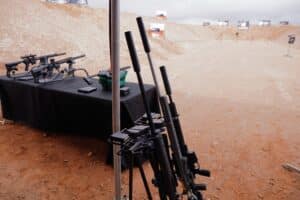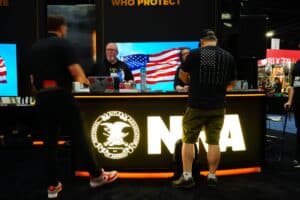Rob Pincus is not shy about sharing his opinions.
The gun-rights advocate and longtime self-defense trainer sat down with The Reload‘s founder Stephen Gutowski to talk about everything from internal NRA politics to 3D-printed guns and the criticism of his provocative approach to gun-rights activism. He knows more than a bit about the former, owing to his time working with the NRA on training videos and running for its board of directors. But his experience in activism and defiant approach to much of the conventional wisdom found in the gun community goes further back, to his early work in firearms training.
Now Pincus is a board member of Save the Second, a group aiming to remove CEO Wayne LaPierre and reform the NRA from within, while he continues work in gun training and suicide prevention. He has also become more engaged in the DIY gun makers community since the pandemic hit and helped organize one of the first shooting matches to feature only homemade guns earlier this year. But his counter-narrative—and sometimes abrasive—approach has drawn criticism from other gun-rights advocates. His partnership with former Brady Campaign president Dan Gross to promote what the two men describe as a compromise approach to gun policy faced heavy backlash since it involves expanded background checks—a proposal that drew ire from other gun-rights advocates. Comments he’s made on how the industry could potentially license their designs to home builders and his tendency to seek out mainstream media attention rather than shun it have also garnered anger in corners of the gun-rights movement.
In Part 1 of this wide-ranging interview, Pincus answered big-picture questions about gun culture and training. He argued there are some orthodoxies that gun-rights proponents need to reexamine, pointing to many positive changes he’s seen in recent years that only came when people were willing to question long-held beliefs. And he responds to complaints from his critics.
The following is the first third of Gutowski’s conversation with Pincus, lightly edited for clarity:
Stephen Gutowski: You’ve been increasingly involved in the gun-rights movement over the last few years on the activism side of things. What is it that made you want to become more of a leader in that area? Obviously, you’ve been around on the training side of things for decades. But it seems like you’ve become more active on the political side of things; what has made you want to jump in more to that aspect of the movement?
Rob Pincus: I think it’s a combination of factors. The biggest one is the opportunity. Like any kind of philanthropic endeavor, I don’t make any money on the advocacy side, or on the politics side. Mostly, it’s me putting money out—occasionally I get expenses covered or whatever. But it takes a lot of time to do it. And you really have to want to do it, and you have to be able to do it. So this is 20 years, July of 2021 is 20 years since I left full-time law enforcement to get into the education space. And it’s the success I’ve had in the education space—financially, professionally—that allows me the time and resources to get more involved in the advocacy.
SG: And since you’ve gotten more involved, you’ve ruffled a lot of feathers, and almost in an intentional way as part of your strategy for advancing your goals. It seems like you are not afraid to pick fights with people, even other people inside the movement. Your most visible action to this point has been with efforts to sort of reform the National Rifle Association. Can you talk a little bit about your approach to gun advocacy, why you go about things the way that you do?
RP: Yeah, it’s absolutely true that I’m not afraid of controversy or afraid to go against the orthodoxy. Again, let’s look at the background. I entered in the training space in the 90s, saying, “Hey, it seems kind of ridiculous that we’re all standing upright, bladed away from the target with our elbows, learning to double-tap.” And, look at our guns when we reload and all this stuff that was going on with what was then the standard of training in law enforcement and personal defense. The 1980s techniques slightly evolved into the 90s. And then even getting into like the upright, isosceles posture, which was more a competition-based posture for swinging through targets—and again, a lot of double-tapping or single-tapping on steel—and that’s not how real fights looked. When we saw real fights in the 90s from dashcam videos and surveillance camera videos, we could finally get past anecdote and see what was really happening. I was young and not indoctrinated into any methodology. So, it was really easy to say, “This seems to make more sense.” To test those theories and have them proven correct and have them work for students, military, law enforcement, civilians in a few cases, but mostly it was the military and law enforcement students I had through the 90s and into the 2000s. That gave us the proof of concept. That was the basis for the training model, even though it was very avant-garde or in people’s faces or contrary or resisted by the old guard. I got picked on a lot there and told I was doing it wrong and ruffled a lot of feathers.
SG: So, you take the same philosophy towards gun-rights advocacy, where your goal is to question a lot of orthodoxy within the gun-rights movement and the way that things have been done for a long time. Can you give me sort of an example of how you believe you’ve successfully done that to this point?
RP: Real advocacy happens outside of the group that wants that change, right? So, if you’re fighting for gun rights, you don’t do that inside of the gun community. All you do in the gun community is maybe educate, maybe empower and help people be more articulate, better representatives or advocates. You definitely fundraise and market and that’s what I think the gun community forgets: The messaging that they’ve gotten for decades from the people who are the leaders of the gun-rights advocacy work—the people that are doing the lobbying, people trying to get politicians elected—they’ve been marketed to by them through fear-mongering. “The UN is coming to get your guns.” Earlier this year, we saw all the hubbub over HR 127, which was never going anywhere. But a lot of the organizations use that as fundraising for the real fights. And I understand that strategy. But, it’s really incredibly important to be honest, to the gun community and gun owners, that real advocacy gets done outside of the community. And I think that’s where our leadership or our representatives have failed the most. And where I think I’ve been very successful, as in talking to people outside of the gun community. Going on The Young Turks, being on The Daily Show, World News Tonight, doing interviews with USA Today, just recently doing a little mini-documentary on the Gun Makers Match with Vice News. We have to be willing to engage people outside of the gun community in meaningful conversations to change their minds. Otherwise, we just have this us-versus-them mentality. And it should be like—no one anymore is advocating that smoking is healthy, right? No one’s out there advocating that drinking and driving is okay. Nobody’s out there advocating that beating your wife is okay because she agreed to obey you. But in the 50s, and 60s, in this country, all three of those things were either swept under the rug or ignored, or just tolerated at a level that was grossly bad and negligent for our families and people’s health, and obviously, women’s safety and mental health and everything else in this country. But we’ve evolved. I believe gun rights are the same thing. We need to stop acting like gun owners are bad or gun rights are bad or guns are scary and educate the rest of the country to say, “Guns do bring risks, we need to mitigate those risks.” But there shouldn’t be a discussion over whether or not they are good or bad, or whether we should have them or not. We have them. Now let’s figure out how to mitigate those risks. And I think I’ve been very successful as have many others that have reached out. But that goes diametrically against the orthodoxy, which doesn’t want to appear on CNN, doesn’t want to sit down and talk to people who have concerns about gun safety. They just want to preach to the choir and do battle in courts or through politicians. Well, the politicians model is failing miserably. We no longer have a party we can trust with our gun rights in this country. The Democrats are moving towards taking away our guns. And I think probably the biggest opportunity we have is motivating the gun owners who aren’t single-issue voters who do vote Democrat to speak up to their party and their politicians and let them know we need to take gun restrictions off the table of the Democratic Party. And the Republican Party, they’re friendlier, but they haven’t been our friends for a long time.
SG: Obviously, this sort of approach that you’re talking about here has led to a lot of people not trusting you within the gun-rights movement. They see you’re dealing with somebody like Dan Gross, who’s a former head of a gun-control group, or saying that you’re open to the commercialization of 3D printed gun designs. There’s been a number of these controversies that have come up around you from inside of the gun-rights movement. What do you say to people who are critical of that? What do you say to somebody who doesn’t think it makes sense to trust CNN or MSNBC or USA Today or any of these other major outlets? And that you’re doing more damage than good by trying to work with people who have demonstrated a distaste for the gun-owning community?
RP: First, there’s no proof that there’s any damage done. When I talk to a research group, like let’s say, Johns Hopkins or something like that. And they say, “We can’t get the NRA to answer us, we can’t get gun owners to give us their feedback on how we do research. So, all we’re left with is the people that seem to be anti-gun-rights giving us information and putting in requests for work, or giving us feedback on our verbiage.” Well, we’re doing ourselves a huge disservice there. It’s not about trusting Johns Hopkins or trusting CNN, it’s about the fact that there are tens of millions of people who trust them. Therefore, if we’re not influencing the conversation, if we’re not part of the conversation, then we lose influence in those circles. And this is that us-versus-them mentality. I think it’s incredibly important also to recognize that a lot of the people that supposedly don’t trust me are acting off of misinformation, which is seeded in the gun community from would-be competitors, or those in the orthodoxy who are threatened by an outside and different approach. It’s exactly the same thing that happened in my training business. Fifteen years ago, when I started getting successful and started really being influential and started changing people’s minds, immediately, it was all “that guy’s techniques will get you killed in the streets.” Well, now it’s “this guy’s techniques are going to get our gun rights taken away.” They were wrong in the 2000s. And the USCCA and Gander Mountain, and all the agencies and all the individuals that are using my material and my approaches for training have proved out the challenge of the orthodoxy correctly. And I believe over time we will see more and more people who are reaching across the line to talk to people outside of the gun community, I think of a Chris Cheng, I think of a Kevin Dixie. We’re seeing other people be very successful with this. Maj Toure. And it will continue to happen.
SG: And what about people who say that your goal is to make yourself famous? I mean, you’re doing all these media interviews, are you just trying to increase your own notoriety, at the expense of the gun rights movement? That’s what they say. How would you respond to something like that?
RP: It’s sad that that’s where someone’s mind goes. You really have to question the mentality of the person who thinks someone who’s speaking on behalf of gun rights on CNN—in a critical, combative environment—and getting criticized by the gun community to do it is somehow doing it to become more popular. First of all, it’s kind of nonsensical. Second of all, I’m already pretty popular, right? So, I don’t know what that means. If I’ve already sold a lot of books, and I’ve already been on a lot of TV shows, and I’ve already taught a lot of classes on a lot of continents, and in a lot of countries, for a lot of people, I don’t know where that mindset comes from. I mean, you could say petty jealousy, you could say fear, you can say a bunch of things. But what there isn’t, I don’t think, is a credible argument that somehow I benefit just from being on TV one more time or doing one more interview.
SG: So you talked about how there’s misinformation out there about the things that you believe or advocate for. Why don’t we Just go over real quick what exactly your views on the Second Amendment are? What do you view as the proper role of government in regulating firearms?
RP: Well, under our Second Amendment, there is no role for the government to play. It’s very clear, right? “Shall not be infringed.” Now, that part is very clear. Unfortunately, there’s an introductory clause which muddies the waters, but the federal courts have, including the Supreme Court, clearly stated that the right to keep and bear arms is an individual right. Now Scalia’s opinion says that there are reasonable restrictions in Heller but those have not been defined. I fall on the side that “shall not be infringed” is really clear. And if we’re going to sit down and say, “Well, but isn’t it a reasonable restriction” followed by anything to me requires a change in the Second Amendment. We have a process to change our Constitution. I’ve invited many gun-control advocates to try it. Go try to find 26 states to ratify a change in the Second Amendment. I don’t think they will. But that challenge is there for them if they want to take it up. The incrementalism and the agreement to smaller restrictions, to me, goes specifically against the Second Amendment.
SG: But does that in your mind apply to things like restrictions on the ownership of guns by convicted felons or those who’ve been adjudicated as a danger to themselves or others? Where does this extend to?
RP: This is where that gray area comes in. We have processes for taking away people’s lives, right? We have the death penalty in this country. So if we have a process for taking away someone’s life. We have a process for warrants, taking away people’s privacy, or surveillance. We have a process for imprisonment, obviously, taking away people’s freedom. Should there be a process for taking away one’s gun rights? I think that they go hand in hand with the idea of losing one’s freedom. So if you’re incarcerated for a justified reason, you’ve been found guilty by a jury of your peers, etc., while you’re in jail, you don’t have access to guns. If you served your sentence, and you’ve “paid your debt to society,” and you’re back out in the public, then should you vote? Yes. Should you have access to firearms? Yes. The problem we have is then going to go fall to the criminal justice side. And I don’t want this to be a cop-out, but it is true that we have to fix our criminal-justice system, we have to fix our mental-health system so that we can clearly identify when people are or are not on the other side of the place where they lost their freedoms. And that’s including involuntary commitments for those who are a danger to themselves or others. Look at red-flag laws: Taking away someone’s guns for some temporary period doesn’t mean they aren’t a danger to themselves or others. It’s a laughable law. That really doesn’t help. And not a single state that has a red-flag law requires mental-health professionals to get involved and actually help the person that we are saying is a danger to themselves or others, we’re just taking their guns away. It’s an insult. It’s an intellectual insult, the red-flag law.
You can read the second part of the interview with Rob Pincus here. If you’re a Reload member, you can read the final part here. If not, join today!
UPDATE 9-9-2021 8:41 pm: This piece has been updated to clarify Rob Pincus ran for but was never seated on the NRA’s board of directors.







One Response
It’s nice to hear someone like Rob Pincus hold the position that if you’re not in jail (and I would add on parole since you’re still under control and have not completed the sentence) your rights should be fully restored. I have advocated that position for many years. I get some pretty strange looks as a result. “You mean you’d give a convicted murderer a gun when they get out of jail?” That question ignores the fact that that ex-con will get a gun anyway. Removing the legal restriction doesn’t change whether they can get a gun, only where and how they can get one. If the courts were forced to acknowledge that the criminal will get a gun when no longer in jail, maybe they’d be a bit more circumspect about sentencing.